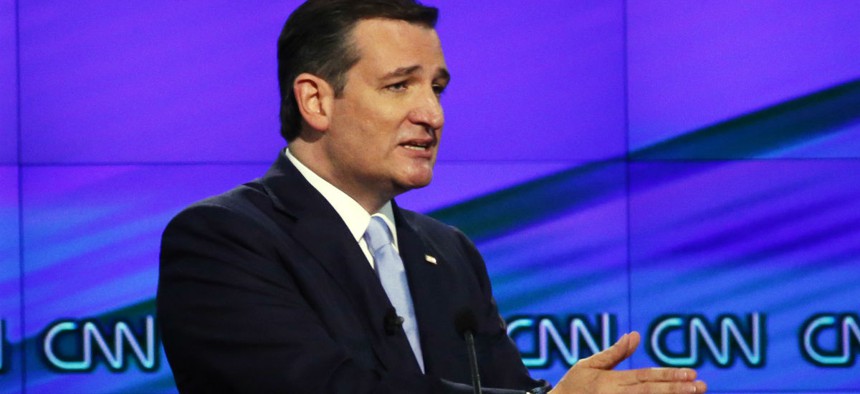
Republican presidential candidate Ted Cruz participates in Thursday's debate. Wilfredo Lee/AP
At Republican Debate, Firing Feds Takes Center Stage
"I will find them and I will fire them," Cruz says of federal workers he doesn't like.
The Republican presidential field has narrowed down to four candidates, but the remaining contenders' rhetoric against federal employees has only ramped up.
In yet another debate -- the 12th such Republican event of the 2016 cycle -- the two remaining senators both took shots at the federal workforce, promising to fire the employees they deem incompetent.
For Sen. Ted Cruz, R-Texas, who trails frontrunner Donald Trump in the current delegate count, the weeding out process will be personal.
“Here's my philosophy,” Cruz explained, “the less government, the more freedom. The fewer bureaucrats, the more prosperity. And there are bureaucrats in Washington right now who are killing jobs and I'll tell you, I know who they are. I will find them and I will fire them.”
The Merit Systems Protection Board might have something to say about Cruz’s proposed wholesale firings over those he deems guilty of “killing jobs,” but that did not stop the senator from issuing the threat. This was not the first time Cruz has put federal workers on notice in his presidential campaign; the senator’s “five for freedom” plan would eliminate several federal agencies and offices, affecting at least 150,000 employees.
Sen. Marco Rubio, R-Fla., who has struggled to win support to this point in the primary campaign, promised to cut the federal workforce with or without help from Democrats in Congress.
“When it comes to shrinking the size of the federal bureaucracy,” he said, “that's probably not going to be bipartisan.”
Rubio also took credit for passing the 2014 Veterans Access, Choice and Accountability Act -- a dubious claim on a measure crafted by Rep. Jeff Miller, R-Fla., and Sen. Bernie Sanders, I-Vt., in conjunction with Sen. John McCain, R-Ariz. -- while highlighting a provision in the law that made it easier for the Veterans Affairs Department to fire senior executives.
“What it did is it created now a law that gives the VA secretary -- because of the law I passed -- it gives the VA secretary the power to fire people that aren't doing a good job,” Rubio said. When asked what he would do to solve the suicide epidemic in the veteran community, he responded he would enforce that law more effectively.
“Senior executives should be held accountable if the VA outreach isn't working,” Rubio said. “The problem is no one's being held accountable. Even after we passed that law, no one's been fired for no outreach. No one's been fired for calls going to the voicemail. No one's been disciplined. No one's been demoted.”
It is worth noting VA has upped its firing rate since Bob McDonald took office as the department’s secretary, and its efforts to dismiss senior executives under the authority created in the 2014 law have been thwarted by MSPB. Still, Rubio promised to correct what he saw as a cultural problem.
“When I'm president of the United States,” he said, “if you work at the VA and you are not doing a good job, you will be fired from your job at the VA.”
NEXT STORY: The One Federal Agency Donald Trump Loves







